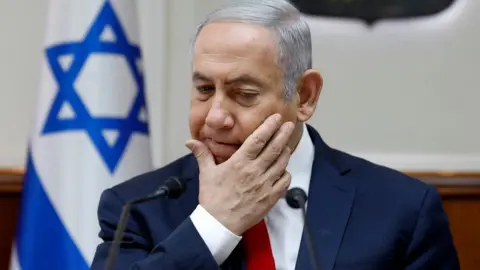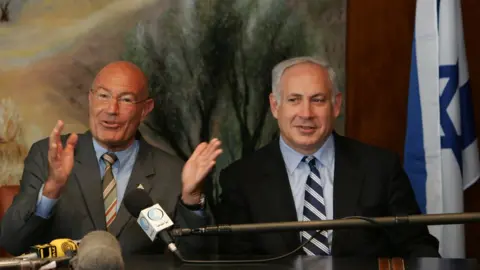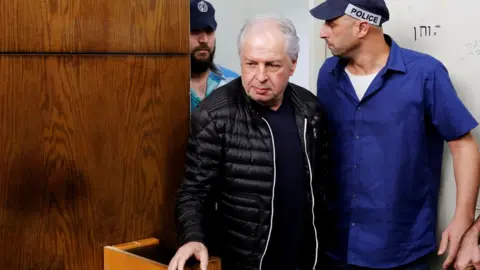Benjamin Netanyahu: What are the corruption charges?
 AFP
AFPIsraeli Prime Minister Benjamin Netanyahu has been indicted on charges of bribery, fraud and breach of trust. The cases involved are known as 1,000, 2,000 and 4,000.
Mr Netanyahu denies any wrongdoing and says he is the victim of a "witch hunt".

Case 1,000
Charges: Fraud and breach of trust
This case concerns the prime minister's relationship with two businessmen: Arnon Milchan, an Israeli Hollywood film producer, and James Packer, an Australian billionaire.
In a document summarising the indictment, Israeli Attorney General Avichai Mandelblit alleged that Mr Netanyahu and his wife, Sara, received various goods from the businessmen, "mainly cigar boxes and cases of champagne".
They were allegedly given in a continuous manner, "such that they became a sort of 'supply channel'". The value of the goods was approximately 700,000 shekels ($198,000; £162,000).
 Getty Images
Getty ImagesGiven the connections between them, Mr Netanyahu "should have refrained from dealing with Mr Milchan's affairs", the attorney general said. Despite this, he claimed, Mr Netanyahu "acted for the benefit of Mr Milchan as part of his official roles" between 2011 and 2016.
Mr Netanyahu has insisted they were merely tokens of friendship and that he did not act inappropriately in exchange for them.
Mr Milchan and Mr Packer are not facing any charges, but like the prime minister they have denied any wrongdoing.

Case 2,000
Charges: Fraud and breach of trust
This case concerns meetings that Mr Netanyahu conducted with Arnon Mozes, a businessman and the controlling shareholder of the Yedioth Ahronoth media group, which publishes a leading Israeli newspaper.
The attorney general's indictment summary said that despite "a profound rivalry" existing between the two men, Mr Netanyahu and Mr Mozes conducted three series of meetings between 2008 and 2014.
"During each of these series of meetings, Mr Netanyahu and Mr Mozes engaged in discussions regarding the promotion of their common interests: improving the coverage that Mr Netanyahu received in the Yedioth Ahronoth media group; and the imposition of restrictions on the Israel Hayom newspaper, which was of significant economic importance for Mr Mozes himself and the Yedioth Ahronoth group," the attorney general alleged.
 Reuters
ReutersAt the time of the last series of meetings, a legislative bill was being considered that would have limited the circulation of Israel Hayom, a free daily newspaper owned by the US casino mogul Sheldon Adelson, a longtime supporter of Mr Netanyahu.
Mr Mandelblit has charged Mr Mozes with bribery.
Both men have denied any wrongdoing, and said they did not intend to promote the matters discussed in their meetings.
Mr Netanyahu has said the legislation concerning Israel Hayom never passed, and that he dissolved his governing coalition in 2015 because of his opposition to it.

Case 4,000
Charges: Bribery, fraud and breach of trust
This case concerns what the attorney general called a "reciprocal arrangement" created between Mr Netanyahu - who also held the post of communications minister from 2014 to 2017 - and Shaul Elovitch, the controlling shareholder in Israel's biggest telecommunications company Bezeq, which owned the news website Walla.
 Reuters
ReutersUnder the alleged arrangement, Mr Elovitch and his wife, Iris, "exerted substantial and continuing pressure" on the director-general of Walla to change its coverage in line with various demands made by Mr Netanyahu and members his family, the attorney general said.
In return, he claimed, Mr Netanyahu "used his powers and authorities as a public servant to promote matters in accordance with Mr Elovitch's wishes" concerning Bezeq. "Mr Netanyahu... dealt on several occasions with regulatory matters pertaining to Mr Elovitch, and took specific actions that promoted significant business interests of Mr Elovitch of substantial financial value."
The attorney general has charged Mr Elovitch and his wife with bribery, obstruction of justice and suborning a witness in connection with an investigation.
Mr Netanyahu, Mr Elovitch and his wife have denied any wrongdoing.
Mr Netanyahu's family are not suspects in this case.
The prime minister has insisted he received nothing from Mr Elovitch and that Walla's coverage of him has been negative. He has said experts supported the regulatory decisions that benefited Bezeq.
